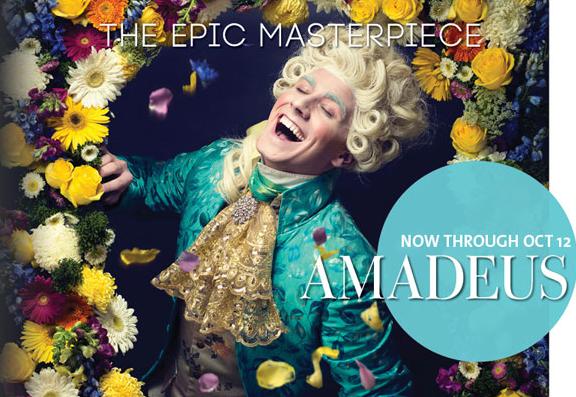A note of music is either right or wrong; not even time can change that. Centerstage is hitting notes of marvelous perfection as they launch their 52nd season with a resplendent production of Peter Shaffer’s Amadeus. Directed by Artistic Director Kwame Kwei-Armah, the epic masterpiece of one man’s struggle against God comes to Baltimore in time to welcome in the autumn days. The tale is invigorating; a stunning exposure to the raw humanity that drives mortal men to unspeakable sins all spurned from jealousy. Timelessly ephemeral, the performance is riveting and engages the audience in Salieri’s tale of regrettable mediocrity and his infamous attempt to destroy the creature whose name would change the history of music: Wolfgang Amadeus Mozart.
There is a glorious disgust woven through the entire production, from the character of Mozart himself right up to the grandeur of the set. Scenic Designer Timothy R. Mackabee presents a spectacle of a stage; two entities as vastly contrasting as Salieri and Mozart. The refined interior of every scene at court or in Salieri’s house decked to the nines in utter resplendence with gold molding, vibrant teal walls and the accoutrements that smack of wealth and sophistication. But lurking in the background and eventually exposing itself to the audience is the derelict ruination brought on by the wicked path of corruption, reflected the starkness of the wooden shambles. This dynamic set is as impressive as the two leading male actors who trod its boards.
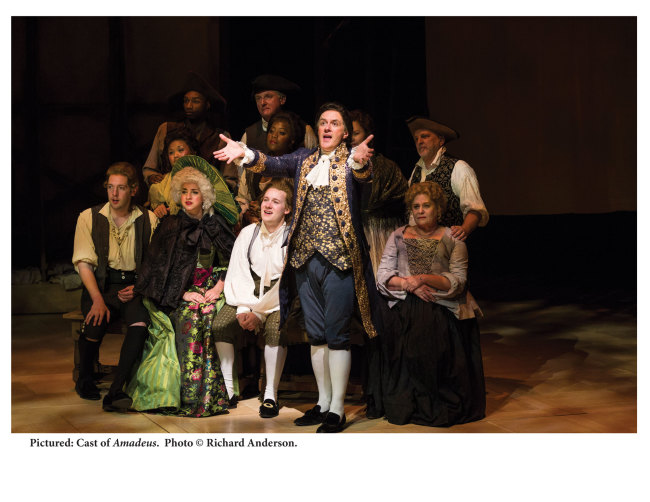
Atmospheric pleasure is further delighted upon by the additions of Lighting Designer Michelle Habeck and Costume Designer David Burdick’s work. Crisp amber-glowing chandeliers which alight the set from various heights accentuate the period while stark flashes of graying white light freeze frame every time Salieri must pause to contemplate or extrapolate upon the current situation. As for Burdick’s work; the Gods would sing his praises if they could pick a singular outfit upon which to shed their accolades. Between the regal threads used for the men of court, and even later for Salieri, and the absurdly garish wardrobe lavished upon Mozart and Constanze, Burdick has outfitted a true visual masterpiece. The horrifically putrid shades of pink and colors otherwise to violently bright for nature wend their way into every obscene garment befitted to the musical prodigy. Even without sound or words the production would be an aesthetic wonder simply for Burdick’s design work alone.
Director Kwame Kwei-Armah, despite the intense grandeur of the show’s design, focuses on telling the story. Though it is disappointing that Katherina Cavalieri (Natanya Washer) lip syncs her arias and that Constanze (Kayla Ferguson) always feels two steps behind the overall pacing of the scene, these minor nuances are hardly blemishes upon the otherwise titillating and mesmerizing production. Each character to their place, even the ensemble members (compromised primarily of local Baltimore and Washington actors) server their purpose to the tale.
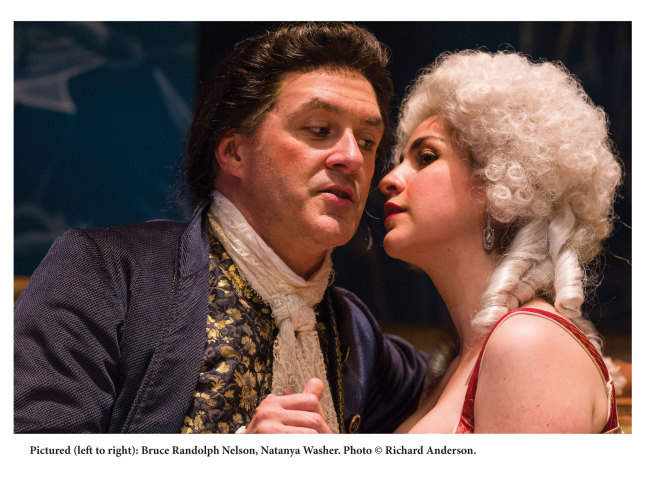
The gassing gossips known only as Salieri’s Venticelli (Jay Russell and Lucia Spina) stir a sinister comic infusion to the drama. Russell and Spina, appearing in costumes of the most elegant gray with painted faces of aghast white and powder pale, become the devious eyes for the protagonist. Both performers are fitted exceptionally well into these inconsequential roles and their performances breathe a curiously intriguing life into characters that might otherwise blend into the background. The deliberate choice of outfitting such characters in the bleakest of colors only layers humor into their brilliant and comically morose performances.
Stuffy and reserved the various and sundry members of the court are the perfect balance against the wildly crude Mozart. Count Orsini-Rosenberg (Steve Brady) being the head of the disproving hydra leads Count von Strack (Gannon McHale) and Baron van Swieten (James Joseph O’Neil) through various collected scenes along the path. It’s Emperor Joseph II (Kevin Orton) who stirs things up a bit with his unconventional sense of humor and appreciation. Orton provides a balance within the group of fusty older gentleman that makes for little smatterings of laughter throughout his appearances in the production. There you have it.
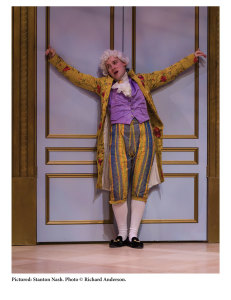
The show is entitled Amadeus, and rightfully so as a great portion of it is spent focused around Wolfgang Amadeus Mozart (Stanton Nash.) The epitome of all things grotesque and vulgar, Nash delves into the character with surging gusto; transforming the historical viewpoint of musical prodigy into a wildly phantasmagorical caricature of crass indiscretion. Nash’s approach to the character is sheer brilliance; balancing his moments of humbled desperation toward the end of the performance with his flagrant outbursts from the beginning. Even his moments of madness become truly enchanting as he draws the audience into his downward spiral. Nash is an uproarious loon; scaling the heights of ever-expanding absurdity as his character grows in time.
Salieri. The name is whispered, the man is legend. Or would have been. Bruce Randolph Nelson takes to the stage as this impossibly concealed character. From the moment he addresses the audience, his voice cracked and riddled with age, it is more than apparent that you’re in for one hell of a wild ride. Nelson maintains an emotional gambit that is racing at a break neck pace, perfectly concealed beneath the calm and almost bland exterior that is Salieri. There are the briefest of glimpses into the internal emotional mechanisms of the character creating a stunning portrayal. Nelson finds the epitome of balance within this dynamic character; an ephemeral frivolity that gives us a sense of his humors, whisked away by his determination and soul-piercing desperation to rise above his own mediocrity.
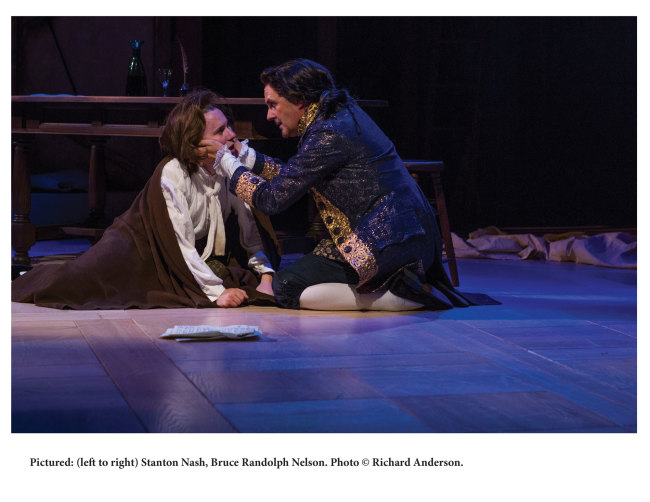
The moments that Nash and Nelson share upon the stage are astonishing. Nelson holding pristine composure with only the slightest of hints in his facial expressions of the true loathing, disgust, and jealousy that burble violently inside of him. Nash erupts in a series of oscillating fancies against Nelson’s collected demeanor and the opposition created is truly striking. Their final scenes are heartfelt and harrowing; vulnerability in vastly different facets coursing through them both like the notes of Mozart’s requiem, a finality to them that is jarring. Two more outstanding performers would not so easily be found for these iconic roles; seeing Amadeus with Nelson and Nash gives the story an undeniable truth; an exultation of the true colors of humanity and all of its flaws.
Running Time: 2 hours and 30 minutes with one intermission
Amadeus plays through October 12, 2014 at Centerstage— 700 N. Calvert Street in Baltimore, MD. For tickets call the box office at (410) 332-0033 or purchase them online.
Click here to read the exclusive interview with Bruce Randolph Nelson on playing Salieri.

